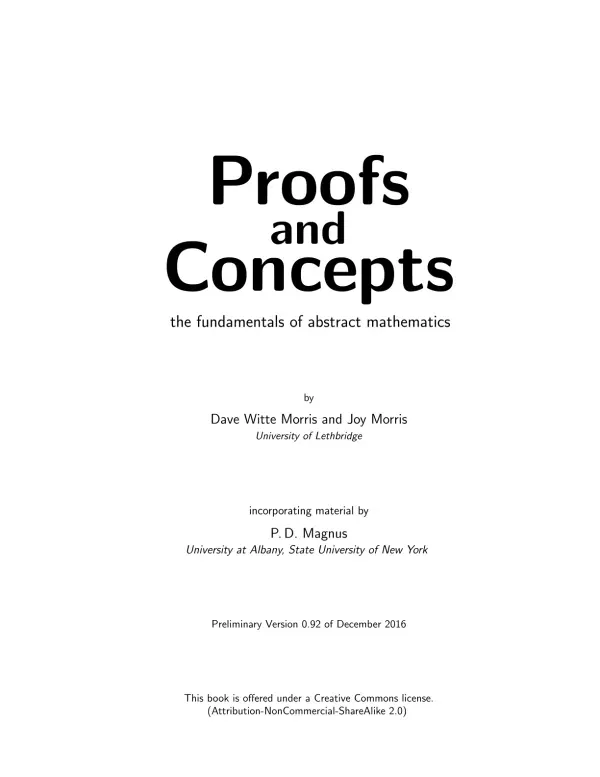
Foundations of Logic and Proofs in Abstract Mathematics
Document information
| Author | Dave Witte Morris |
| instructor | P. D. Magnus |
| School | University of Lethbridge |
| Year of publication | 2016 |
| Place | Lethbridge |
| Document type | textbook |
| Language | English |
| Number of pages | 195 |
| Format | |
| Size | 841.15 KB |
- Logic
- Proof Techniques
- Abstract Mathematics
Summary
I. Introduction to Logic and Proofs
The foundation of logic and proofs in abstract mathematics is crucial for students pursuing advanced studies. This section emphasizes the importance of understanding proof techniques and their underlying logical principles. The textbook aims to equip students with the skills necessary to construct valid arguments and proofs, which are essential in higher mathematics. The authors highlight that success in mathematics is not merely about finding the correct answer but rather about providing a convincing explanation for that answer. This shift in focus necessitates a deep understanding of propositional logic, which serves as the starting point for developing proof strategies. The integration of sets and quantifiers leads to first-order logic, a more complex language that is fundamental in modern mathematical discourse. The authors also introduce the concept of cardinality, which challenges students to grapple with the notion of uncountable sets. This foundational knowledge is vital for students as they progress in their mathematical education.
1.1 The Role of Proofs in Mathematics
Proofs are the backbone of mathematical reasoning. They provide a structured way to validate claims and establish truths within the mathematical framework. The authors assert that understanding the structure of proofs is essential for students, as it fosters critical thinking and analytical skills. The textbook outlines various proof techniques, including direct proofs, proof by contradiction, and induction. Each method is accompanied by examples that illustrate its application in solving mathematical problems. The emphasis on validity and soundness in proofs ensures that students learn to differentiate between correct and incorrect reasoning. This section serves as a guide for students to develop their proof-writing skills, which are indispensable in both academic and professional settings.
II. Propositional Logic
Propositional logic forms the basis of logical reasoning in mathematics. It involves the use of assertions, deductions, and validity to construct logical statements. The authors delve into the components of propositional logic, including connectives such as conjunction, disjunction, and negation. Understanding these elements is crucial for students as they learn to manipulate logical statements and derive conclusions. The section also addresses the importance of tautologies and contradictions, which are fundamental concepts in evaluating the truth of logical expressions. By mastering propositional logic, students gain the tools necessary to engage with more complex logical systems, paving the way for their success in advanced mathematics.
2.1 Valid Deductions and Logical Equivalence
The concepts of valid deductions and logical equivalence are central to understanding propositional logic. The authors explain how to determine whether an assertion is true and how to identify equivalent statements. This knowledge is essential for constructing valid arguments and proofs. The section includes exercises that challenge students to apply these concepts in various scenarios, reinforcing their understanding of logical reasoning. The ability to recognize logical equivalences enhances students' problem-solving skills and prepares them for more advanced topics in mathematics.
III. Sets and First Order Logic
Sets are fundamental to the study of mathematics, providing a framework for organizing and analyzing mathematical objects. The authors introduce the concept of sets, subsets, and predicates, emphasizing their significance in mathematical reasoning. The exploration of operations on sets, such as union, intersection, and difference, equips students with the tools to manipulate and analyze sets effectively. The transition to first-order logic expands the students' understanding of logical reasoning by introducing quantifiers and their applications. This section highlights the importance of mastering these concepts, as they are essential for success in higher-level mathematics and related fields.
3.1 Quantifiers and Their Role
Quantifiers play a crucial role in first-order logic, allowing mathematicians to express statements about collections of objects. The authors explain the difference between universal and existential quantifiers, providing examples that illustrate their use in mathematical statements. Understanding quantifiers is vital for students as they learn to formulate and analyze complex logical expressions. This section encourages students to practice translating statements into first-order logic, reinforcing their comprehension of the material. The ability to work with quantifiers enhances students' analytical skills and prepares them for advanced studies in mathematics.
Document reference
- forall x An Introduction to Formal Logic (P. D. Magnus)
- Proofs Concepts and the fundamentals of abstract mathematics (Dave Witte Morris and Joy Morris)
- Creative Commons license
- Cardinality
- Number Theory: divisibility and congruence
